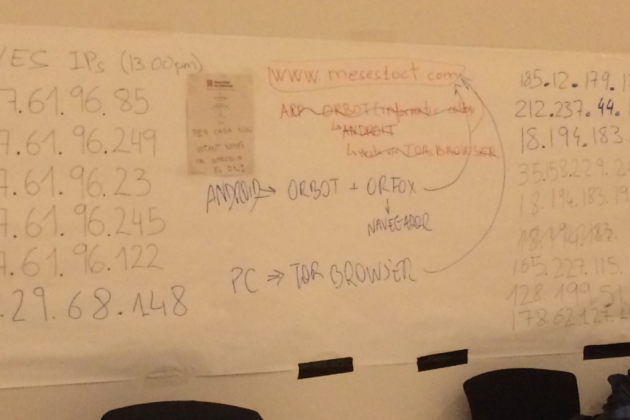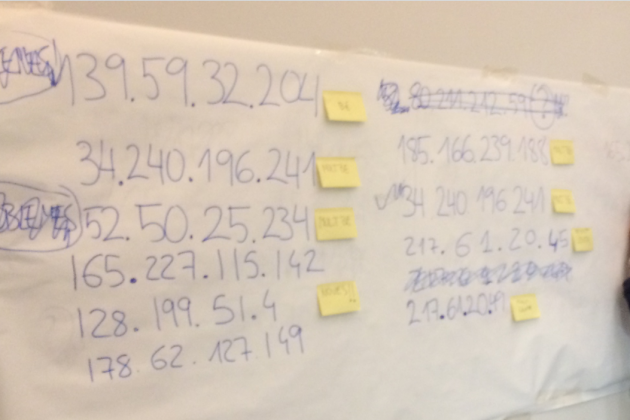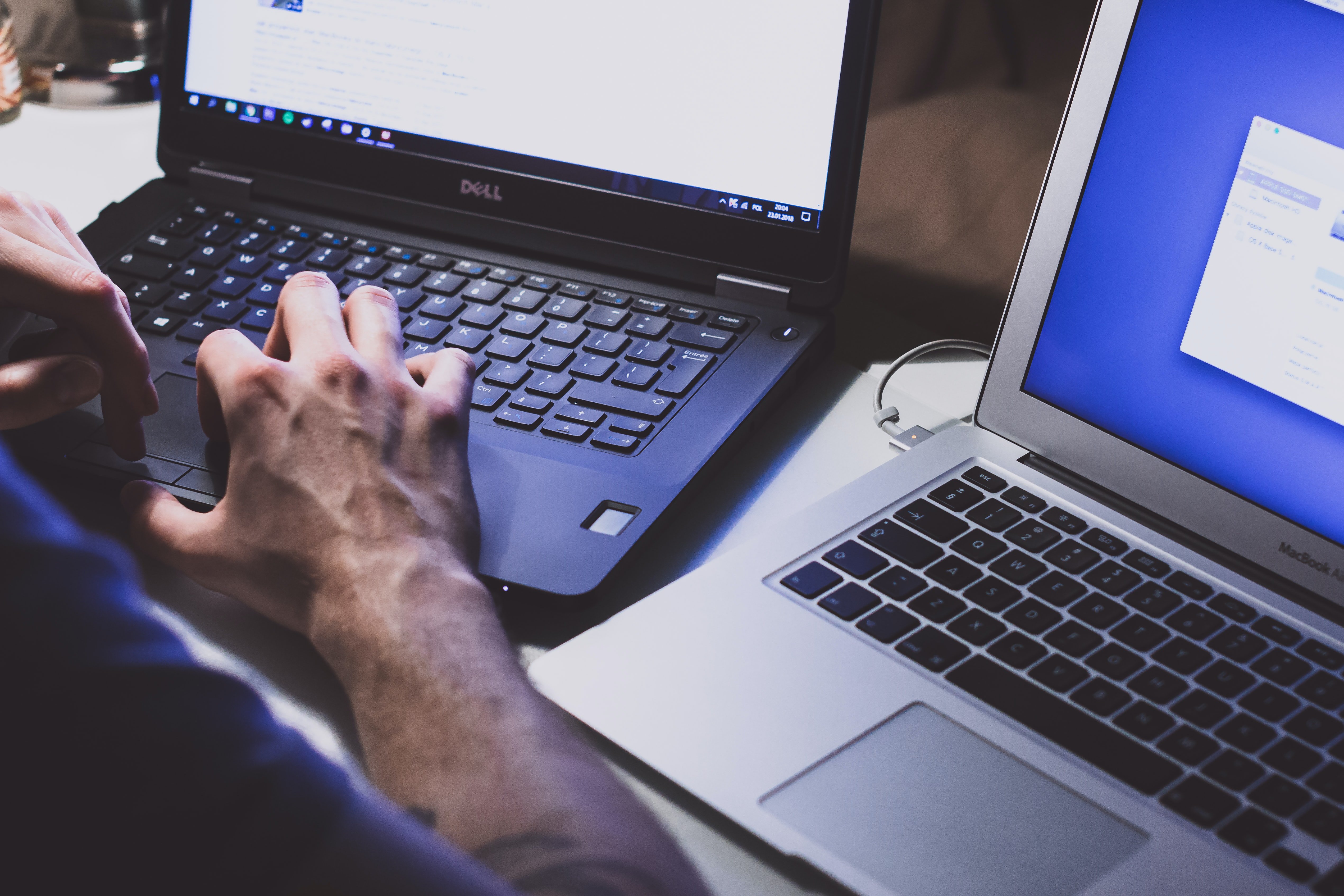A small team of volunteers who installed themselves for three days in the Palau de la Generalitat, seat of the Catalan government in Barcelona, was responsible for activating the definitive master stroke that paved the way for the October 1st referendum: the universal electoral roll, to allow voters to cast their ballot even if their usual polling place had been closed down. ElNacional.cat has put together the account of how it all came together, through one of its protagonists. Over the three day period between Friday 29th September, 2017 - just two days before the vote - and the Sunday night, when voting closed in the referendum, a group of computer scientists took on the task of enabling the system, getting it up and running, and then fighting the attacks that tried to bring it down. All this while police surveillance was constantly hovering over the Palau.
Andreu is not the real name of the protagonist of this story, nor is it his voice in the recording below, in Catalan. Andreu's role in the October 1st referendum began at the beginning of September, when a person he trusted contacted him to ask if he would be willing to take part in the process of counting votes. He said yes to taking part, but the next development in the story didn't reach him until Friday, September 29th, when he received a call at work to say that someone would be contacting him. A person who invited him to an emblematic place in the city. "He jokingly told me to bring my pyjamas," he recalls.
The team responsible for the voting system came together in the Palau de la Generalitat, on Barcelona's Plaça Sant Jaume. "It was in the elevator that they explained to me that a universal electoral roll was being prepared and asked me if I would be able to send thousands of PDFs automatically. The first thing that came to my mind was to tell them openly that this would be knocked over at the first opportunity", he explains.
What is a universal electoral roll? In Spanish and Catalan elections, voters are assigned to a polling place close to their home address. They can normally only vote at that polling place, which is thus easily able to manage the roll (or register) of its assigned local voters, and to ensure that no-one votes twice. A universal electoral roll is a more complex affair, requiring reliable systems and communications, because it allows anyone to vote at any polling place, while also maintaining all the necessary checks, such as ensuring that no-one votes twice. But given the likelihood of attempts to close down at least some polling places, it seemed possible that the success of the 1-O referendum could hinge on the ability of voters to be able to vote at a different place than their assigned centre if required.
There were only two days to go until October 1st when Andreu entered the Palau room where there were already a dozen people who were preparing the details of the universal roll program that had to be uploaded to the cloud. At the same time, letters were being prepared for each of the voting centres with the instructions for use and the codes for each table.
We started to create email accounts associated with foreign phone numbers. But all of a sudden our internet was cut and we had no way to send emails
After a very long Friday, Andreu left the Palau sometime between 4 and 5 in the morning. On Saturday they summoned him again. It had been definitively decided to apply the universal roll. "Emails with the full roll had to be sent to all the electoral tables from anonymous accounts. We started to create email accounts associated with foreign phone numbers. But all of a sudden our internet was cut and we had no way to send emails", he says.
As problems arose, new volunteers were sought to overcome them. Everything moved quickly. Only hours were left until the start of voting. "While we were there a person was called and I heard them say: 'I was told that you can set up a telephone switchboard, for about 100 people. Can you come now?'. Just like that, and shortly afterwards, that person appeared to set up the call centre system in two rooms on another floor," explains Andreu.
Another person arrived wearing a long coat. From under his coat he pulled out a satellite dish! We set it up when the helicopter was further away
The communications were not good and were often cut. "We were nervous," admits the computer scientist, before explaining one of the most surreal episodes of the day: "They also alerted another person, who arrived when it was already dark, wearing a long coat. I remember this tall, fat man entering, and from under his coat he pulled out a satellite dish! And he asked us to help him. We mounted it on the roof between a group of us. We did it when the helicopter that was flying overhead and shining a spotlight was far away. Finally he stretched out a cable. He connected it to a device he was carrying, and in turn to a board that encrypted the communications. Miraculously, we had internet again."
Throughout the weekend, members of the Catalan government appeared in the room on different occasions to support the volunteers. "I greeted them with astonishment and one of them uttered a sentence that gave us goosebumps: 'The independence process is in your hands,'" recalls Andreu.
Saturday night was very long, with tests of the universal roll, testing different Internet Protocol (IP) addresses, the specific addresses identifying devices on the network - because blocking an IP address would be one way that an opponent could paralyze the system. Some of those present took advantage of a couple of hours to rest in a room with sofas. Andreu admits that he couldn't sleep, overwhelmed by adrenalin and the noise of the helicopter that flew over the Palau all night. He confesses that this was the first time he had thought about what would happen if the police burst in and arrested everyone who was there preparing for the referendum.

On Sunday everyone got going again at six in the morning. It had not yet been announced that the universal roll would be activated. Training had to be prepared for those who would have to answer questions about the system over the phone and more IP addresses needed to be obtained. At 7 or 8 in the morning, between 60 and 100 volunteers, with their mobile phones, entered the rooms equipped to answer the calls: they would have the job of answering the calls that came in from the polling places. They were euphoric and Andreu confesses that that image "recharged his batteries".
Finally, just before the polls opened, the universal roll was announced. Immediately, the Spanish deputy prime minister, Soraya Sáenz de Santamaría, appeared on television saying that they had suppressed it. The calls began. And the introduction of alternative IPs began, with the numbers being written on a whiteboard in the room, as shown in the photographs. "The information system worked perfectly!" he celebrates.

"The morning was quite stressful, especially because of the videos that we were seeing, and we solved the incidents as best we could. The communications of many schools were cut and there was little we could do about that other than tell them not to connect through wifis and the famous airplane mode to be able to let the people at the electoral table connect".
We found out that the IPs were being published in the Forocoches internet forum so many people were attacking us at the same time
From their system they were able to monitor the number of people who had voted. But the alternative IPs were starting to run out, as a result of the attacks, faster and faster. The purchase of new IPs went on, and these were being supplied to the people who answered the calls from the voting centres. There were also cuts in access to a cloud service provider where the IPs were, and microcuts. The problems multipled: "We found out that the IPs were being published in the Forocoches internet forum and this meant that many people were attacking us at the same time."
A moment to vote
In the middle of the afternoon, when the process was working more smoothly, the volunteers were able to take advantage to go out and vote at a nearby school. There they also ran into one of the many incidents that were recorded throughout the day, when those present at the polling station spotted a couple of "suspicious people". Suddenly, they found themselves locked inside the school. "The people inside were scared, and there was a crowd outside. It was a narrow street," he explains.
Despite the tension of the moment, the situation also provided an anecdote when, since the polling place was not their normally assigned local centre, they had to take advantage themselves of the universal roll and vote at a table where it was enabled, "but this one wasn't working": "We asked them what was wrong and if they had called the help numbers. They said that they had called many times, that they had been changing IPs and now they had stopped. They looked very tired. We asked if we could look at it and one of the others in the team fixed it in a moment. The person at the table gave a surprised look and my colleague said to them in a low voice, 'I'm the father of the baby', and the look on the person's face showed even more surprise."
Around seven in the evening, the possibility of extending the vote was put on the table, but the idea was rejected. At 8pm, the polls close. The last delicate moment of the day begins and the one that kept those responsible for the referendum most concerned, the vote count. This was handled by another team. "The universal roll worked despite the difficulties," he explains, not without some pride.
And, suddenly, the hectic day at the Palau ended: "We destroyed all the papers and all the sensitive material. We left in a group in case they were waiting for us. I was picked up by car at a nearby location, and on the way home I saw nothing but police vans everywhere. I will never forget what happened that day. The feeling is one of bittersweet victory. Together, we did something very big."

